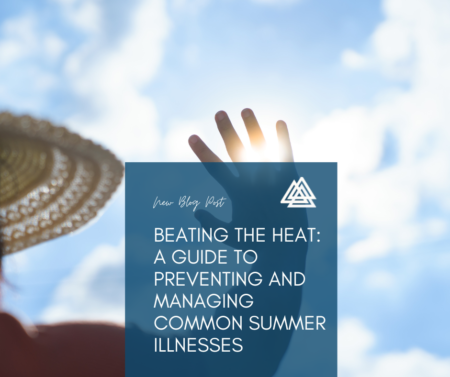 Summer brings sunshine, outdoor activities, and longer days, but it also comes with its own set of health challenges. High temperatures, increased humidity, and prolonged exposure to the sun can lead to various summer illnesses. Understanding these risks and knowing how to prevent and manage them is crucial for a safe and enjoyable summer. This guide will help you beat the heat and stay healthy throughout the season.
Summer brings sunshine, outdoor activities, and longer days, but it also comes with its own set of health challenges. High temperatures, increased humidity, and prolonged exposure to the sun can lead to various summer illnesses. Understanding these risks and knowing how to prevent and manage them is crucial for a safe and enjoyable summer. This guide will help you beat the heat and stay healthy throughout the season.
Common Summer Illnesses
Heat Exhaustion and Heat Stroke
Heat Exhaustion:
- Symptoms: Heavy sweating, weakness, dizziness, nausea, headache, and muscle cramps.
- Prevention: Stay hydrated, wear light clothing, and take breaks in the shade or indoors during peak heat hours.
Heat Stroke:
- Symptoms: High body temperature, altered mental state, rapid pulse, and hot, dry skin.
- Prevention: Avoid strenuous activities during extreme heat, drink plenty of fluids, and use fans or air conditioning to stay cool.
- Management: Move the person to a cooler place, apply cool cloths to the skin, and seek emergency medical attention immediately.
Dehydration
Symptoms:
- Thirst, dry mouth, dark urine, dizziness, and fatigue.
Prevention:
- Drink water regularly, even if you don’t feel thirsty. Avoid excessive alcohol and caffeine, which can dehydrate the body.
Management:
- Increase fluid intake with water or electrolyte solutions. In severe cases, seek medical attention.
Sunburn
Symptoms:
- Red, painful skin that feels hot to the touch, swelling, and blisters.
Prevention:
- Apply broad-spectrum sunscreen with at least SPF 30, wear protective clothing, and avoid direct sun exposure during peak hours (10 a.m. to 4 p.m.).
Management:
- Apply aloe vera or moisturizing lotions, take cool baths, and avoid further sun exposure. For severe burns, seek medical attention.
Food Poisoning
Symptoms:
- Nausea, vomiting, diarrhea, stomach cramps, and fever.
Prevention:
- Practice proper food hygiene by washing hands, keeping raw and cooked foods separate, and ensuring food is cooked thoroughly and stored at safe temperatures.
Management:
- Stay hydrated, rest, and consume bland foods. If symptoms are severe or persistent, seek medical attention.
Allergies and Asthma
Symptoms:
- Sneezing, runny nose, itchy eyes, wheezing, and shortness of breath.
Prevention:
- Monitor pollen forecasts, keep windows closed during high pollen days, and use air purifiers. Carry medications such as antihistamines and inhalers as needed.
Management:
- Follow your allergy or asthma action plan, take prescribed medications, and seek medical help if symptoms worsen.
Insect Bites and Stings
Symptoms:
- Redness, swelling, itching, and pain at the bite or sting site. In severe cases, allergic reactions such as difficulty breathing may occur.
Prevention:
- Use insect repellent, wear long sleeves and pants, and avoid scented lotions or perfumes that attract insects.
Management:
- Clean the area with soap and water, apply ice to reduce swelling, and use antihistamines for itching. Seek medical attention for severe reactions.
General Tips for Staying Healthy in Summer
Stay Hydrated
- Drink plenty of water throughout the day, especially during outdoor activities.
- Eat water-rich foods like fruits and vegetables to help maintain hydration.
Dress Appropriately
- Wear light, loose-fitting clothing made of breathable fabrics like cotton.
- Opt for light-colored clothing to reflect, rather than absorb, the sun’s heat.
Practice Sun Safety
- Apply sunscreen 30 minutes before going outdoors and reapply every two hours, or after swimming or sweating.
- Wear a wide-brimmed hat, sunglasses, and seek shade whenever possible.
Plan Outdoor Activities Wisely
- Schedule outdoor activities in the early morning or late evening when temperatures are cooler.
- Take frequent breaks in the shade or indoors to avoid overexertion.
Maintain Good Hygiene
- Wash hands regularly, especially before eating or preparing food.
- Shower after swimming to remove chlorine or saltwater, which can irritate the skin.
Keep Indoor Environments Cool
- Use fans or air conditioning to keep indoor spaces cool.
- Close curtains or blinds during the hottest part of the day to keep the heat out.
Monitor Weather Conditions
- Stay informed about weather forecasts and heat advisories.
- Know the signs of heat-related illnesses and be prepared to act quickly if symptoms arise.
Summer is a time for fun and relaxation, but it’s important to be mindful of the health risks associated with the season. By taking preventive measures and knowing how to manage common summer illnesses, you can ensure that your summer is safe and enjoyable. Stay hydrated, protect yourself from the sun, and be prepared to handle any health issues that arise. With these tips, you’ll be well-equipped to beat the heat and make the most of your summer.
